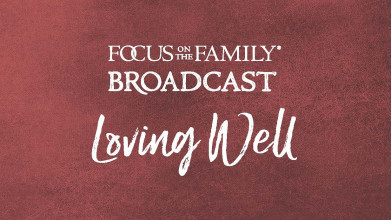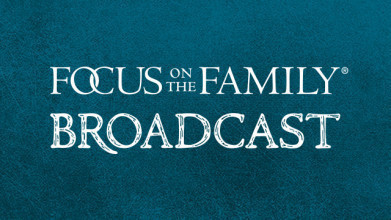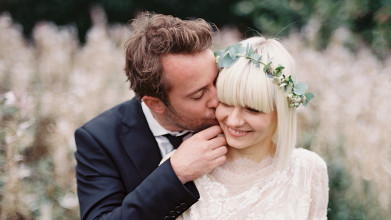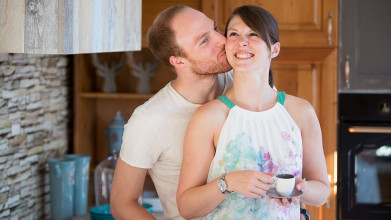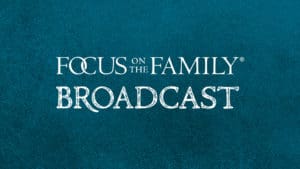John Fuller: Today on Focus on the Family, we’ll share more insights about how to move your marriage from good to great. And our guest is Katharine Hill. She has some simple strategies and tips like this, which can transform the relationship with your spouse.
Katharine Hill: I think compromise is a really good tool and it can get us out of some, uh, difficult situations. But ultimately, what can happen is one or the other is the one who always ends up giving in, and you end up with not the best. And so what we talk about instead, is finding the third way. So finding something that is a bit- a bit of him and a bit of you. And finding a different solution that you’re both really happy with.
John: I am John Fuller, and your host is Focus president and author, Jim Daly.
Jim Daly: John, last time we featured a wonderful conversation that I recorded with our guest during a trip to Scotland. Uh, if you missed the first part of that, uh, contact us, uh, to get a copy or a download or by podcast, uh, you can find that episode. You won’t be disappointed. And we mentioned last time that Katharine Hill is one of the leaders of Care for the Family, a sister organization to Focus on the Family. And they offer Bible-based advice and encouragement to families in the United Kingdom. Uh, she’s an author and speaker and former attorney, who saw firsthand the devastation of broken marriages and broken families. So today, she’s working to strengthen and encourage families in the context of marriage and parenting. And we are thrilled to have her as a guest again today on the broadcast.
John: And you recorded this interview, uh, with a live audience of some Focus friends, uh, in the room. And we’re gonna hear from a few of them later on in this recording. Right now, here’s part two of the conversation Jim had with Katharine Hill on Focus on the Family.
Jim: Katharine, welcome back.
Katharine: Thank you.
Jim: It’s so good to be with you. And I love this book: If You Forget Everything Else, Remember This. And what would be the main point you’re trying to get to?
Katharine: Oh, there’s lots. Well, the idea of the book was to have lots of, uh, short chapters with memorable headings. So in the busyness of life, if you could just bring one thing to mind, a bit like the Book of Proverbs, just remember one thing, and then put that into practice in your marriage. But if I had to choose one, I will probably say that love is a choice. So on our wedding day, we promise to love the other person for better, for worse, for richer, for poorer, sickness and in health. And just remembering that, that actually, we need to make that promise and remember that every day.
Jim: Especially when there’s dirty socks everywhere, right? (Laughs).
Katharine: And wet towels on the floor.
Jim: And wet towels on the floor. I do wanna mention the busyness side, because I think, uh, here at Focus on the Family, a lot of couples will contact us. And that’s one of the pet peeves for either one of ’em. Speak to the busyness of life. And how do we adjust that so we’re healthier as a couple even though life is busy?
Katharine: Well, I think most of us are busy. There are maybe a few people that have a lot of time on their hands. But I think generally, um, people live in a… in the fast lane.
Jim: Yeah.
Katharine: And we’re busy. Maybe we are working outside the home, and we’re trying to bring up kids and we’re trying to work at our marriage. Um, there’s just more and more things to do. And I think it’s compounded by the digital age. So 24/7 now through the smartphone in your pocket, uh, we are connected to more people than ever before. But actually, sometimes the people that we’re closest to, um, we don’t spend that time actually communicating where-
Jim: You know, in- in the UK, like in the US, the amount of time that couples spend communicating deeply together is far less than 30 minutes a day. I mean, in some cases, some studies show three to four minutes a day. You can’t survive on that, can you?
Katharine: … You can’t. Uh, you know, some run- run out to the work in the morning, grabbing piece of toast on the way, and then come in late in the evening, busy at night. I think if we’re involved in church activity as well, um, that can also take its toll. And then we end up burning the candle at both ends, and not having enough time for each other. In fact, I remember being, uh, on holiday years ago now when our children were little. And we were in a cottage. And the other side of the cottage, another couple had, uh… were also on holiday. And they both had really busy jobs. They worked in the media, and they had children. And I remember the wife saying to me, “Katharine, uh, don’t do what we’ve done. We’ve both had busy jobs, we’ve both tried to have everything and do everything. And we found when we get home in the evening, we haven’t got the time for each other.”
Jim: Yeah.
Katharine: And I’ve never forgotten that.
Jim: Yeah. You know, w- within the male conversation, often this is a badge of honor. “How you doing?” “Oh, I’m so busy. You know, I got this deal and I did this. And then yeah, I had to fly here and do that.” Because we react to that like, “Wow, that guy is special. He does so much.” That’s not a healthy thing, right?
Katharine: Well, sometimes I think it can… uh, we can fool ourselves that we are being significant because we’re busy. I also think it’s possible to be busy on the outside, but hurry is the enemy of our souls.
Jim: Oh, wow. That’s good.
Katharine: And I think if we try and not be hurried on the inside. Because we do have stuff to do. We have to put food on the table.
Jim: Yeah.
Katharine: Um, but if we can learn to live at a pace, and also make time for each other.
Jim: And-
Katharine: I think that’s the key.
Jim: … Katharine, you have a poem in your book, which this is the perfect spot for you to read this to us. Uh, it gripped my heart. Uh, share it with us.
Katharine: It’s all about the, um, how much we value time. And, uh, it says this, “To know the value of one month, ask the mother of a premature baby. To know the value of a week, ask the writer of a weekly blog. To know the value of a day, ask the dad who sees his children on Saturdays. To know the value of an hour, ask the young man waiting for his fiancé to call. To know the value of a minute, ask the teenager who just missed the last bus home. To know the value of a second, ask the driver who just avoided the accident. And to know the value of a millisecond, ask the athlete who won the silver medal.”
Jim: Those are good perspectives. Those are all special insights, right?
Katharine: They are. And there’s… I think it also conveys the fact that sometimes it’s not just the amount of time, but it’s what we do with it that’s important. And certainly, in marriage, we’ve got those little moments when we can connect over everyday things. But it’s good sometimes just to make time, to put time in the diary. It- it sounds a bit, uh, prosaic, it sounds a bit- bit sort of structured. But sometimes, we just have to do it.
Jim: I like that. Uh, let’s turn a corner and speak to the issue of friendship. Uh, at least in the US, I’m assuming it’s similar in the UK. Um, uh, we don’t really know our neighbors sometimes, you know? You hit the garage door button, you go in, you do family, you go to work, you come home, hit that same garage door button. You might wave. And if they need you, they might call for something and vice versa. But you speak to the need of marriages in order to be healthy, that you need intimate friends who can do life with you. Speak to that.
Katharine: That has been one lesson that ha- we have really learnt throughout our marriage. Um, I think marriage is too hard to do it on our own. We need friends around us who are there for us.
Jim: So why are we secretive about it? Why do we avoid those relationships where they can speak into our lives?
Katharine: Well, it takes courage, I think, to be vulnerable. So we have, um, one other couple. And we didn’t plan it particularly. It’s just happened. We’re not particularly similar, but we meet up with them once a fortnight. We have a meal, um, we laugh together. Sometimes we cry together. We pray together. And I know that they have got our back and we have got theirs. And they have saved us, I know, from, uh, slipping up, particularly in relation to marriage. So I remember one evening, and we were… Richard and I were being a bit irritable with each other. And, um, Silas, the other guy, he just leant across the table, and he said, uh, “Guys, are you spending enough time together?” And we weren’t. But it took him to speak into our marriage, and for us to be vulnerable enough to let him, uh, that made all the difference.
Jim: I mean, this sounds very practical, but how do you have that conversation? What… Do you say to them, “Listen, we want you to be able to speak into our lives, so if you notice something”? That can be really dicey. ‘Cause some people won’t manage that well. How did you set that up?
Katharine: Well, I think for us, it grew organically. So we didn’t plan it; it just happened. And, um, the other couple had an issue that they needed some help with, we were able to help them. And it grew from there. But we spent quite a lot of time with some young couples from our church, those who are in their 20s and 30s, been married for less than five years.
And one of the things we say to them is, “Do this. Try and find, um, another married couple that you can spend time with.” And they s- always say that, “Well, how do we do it? And what if we ask them and they say no?” And all this. But honestly, it’s just find another couple that are- that are… they don’t have to be your best friends. Someone that you trust, someone that you like, someone that you want to spend some time with. And you don’t have to bear your soul overnight. It can just grow gradually.
Jim: Yeah, organically is good.
Katharine: Yes.
Jim: Rather than, uh, prescriptive.
Katharine: Exactly.
Jim: Okay, good. Katharine, you encourage couples to have a shared vision. And people listening now, some are saying, “I don’t even… What do you mean?”
Katharine: Well again, when couples are first married, sometimes in marriage preparation, we’ll say to them, “What are gonna be your priorities in your marriage?” You’ve got each other, you’ve got your relationship with friends, you might have children, uh, you’ve got your relationship with God. So what order are you gonna put those in? What things are gonna come first? And we encourage couples to do that. And then it’s really building on that. And, uh, I think couples can just sit down and think and pray and say, “What is it in our marriage that we can do that is bigger than the sum of the two of us?” S-
Jim: So what… An example for you and Richard, what would that look like?
Katharine: … Well, an easy example for us would be the stuff that we do in relation to coming alongside other married couples and families. We both have a passion for relationships, we both have a passion to see family life strengthened. And so that’s one thing that works for us. And we open our home, um, we have lots of people who come through. We particularly, at the moment, um, feel quite passionate about inputting the lives of the 20s and 30s who are just starting off. So that for us, has been something. But it could be anything. It doesn’t have to be related to anything like that at all. It could be, you know, that you- you love to… it could be a serving thing. It could be, um, that it’s… I think it’s something that… where you want to make a difference in the world. Trying to do something that will better, uh, your community-
Jim: Yeah.
Katharine: … is often a good place to start. But something to do with your home, maybe you’re homemakers and you want to have your home as a place where you’re gonna invite people in.
Jim: So hospitality.
Katharine: Hospitality.
Jim: Yeah.
Katharine: It might be that you want to go and help in a local school because you’ve got a passion for, um, you know, young people. Whatever it is, just have- have something. Or it might be… I think a really good thing, if you don’t know where to start, is to, uh, sit down, pray together, ask other people, uh, what are the things that you see God wants to do in us and through us, um, in our marriage. And then just make some baby steps to begin that. But having that vision that’s- that’s bigger than the sum of the two of you, I think not only benefits, uh, the people that you’re gonna help, but also strengthens your own relationship.
Jim: That’s a good piece of advice. So your vision can be born out of your passion as a couple. And I… it might be possible that couples have not even talked about that, “What is our passion?”
Katharine: And it might be that they have very different passions. And in which case, um, they need to just think about that. But I think just having that idea that our marriage is bigger than just the two of us, and that God has purposes-
Jim: Right.
Katharine: … for us, is good.
Jim: That’s a great statement. Uh, uh, transitions you’ve mentioned, um, the birth of your first child. Uh, Jean and I are at that point where our oldest is leaving the house. And that’s big. Speak to the issues of transition, and how we cope with them.
Katharine: Yeah. So our four left home and we navigated that season of transition. And then they came back again, so. Um, but now they’ve left again. So I think that very often, um, we- we don’t do this very well mainly because we haven’t done the, uh, the groundwork early on. And it’s being flexible, and it’s being prepared to change, and it’s being able to just see how we can meet each other’s needs. And there’s a lovely story of, um, a lady who talked about going out for a walk with her husband, and how he slowed his step down for hers because her knees have gone a bit arthritic these days. And he needs a bit more time when he goes home. So she knows to allow him that. But I think… So it’s- it’s looking at the adjustments that we have to make as we enter the different seasons of marriage. There’s an African proverb, and it says, “As the music changes, so does the dance.” And it’s thinking ahead, and investing in the relationship now and keeping communicating about how that season has changed.
Jim: So in that experience that you’ve had with couples that become empt- empty-nesters, and with the amount of drama in couples that are becoming empty-nesters, what are two or three things that we should do to guard ourselves from losing each other, emotionally?
Katharine: I think spending time together, having fun and laughing together. Laughter. The Bible says, “A cheerful heart is good medicine.” And I think finding things that make us laugh, um, that draw us together. Sometimes thinking about what were the things we used to do, um, before the kids left home. And trying to build that into our marriage, and spending that time together. But talking about how we feel. So maybe when a child leaves home, often, I think, um, is the wife finds it a more difficult thing sometimes than the husband because she’s been more involved in the day-to-day care and the arrangements. Now, it could of course be the other way around. But allowing for that, and allowing yourself to grieve if you need to as you move onto a new season.
Jim: Yeah. In that regard, men tend to look for significance in our vocation, our title, what we do. And I think for many, many women, uh, the relationship with their children and that transition to empty nest, this is, you know, this is their mark of significance. And this is what they’ve been doing for 18, 19 years. Maybe 20, 30 years, if they have three or four children. And it’s hard to just end that. What would you say, specifically, to mothers about how to transition in a healthy way?
Katharine: I think that often, as mothers, our identity is in as being a mum, particularly if we have invested in that a long time over a good number of years. And it can be a similar transition if we’ve been working, and then we stop work because we’re… we’ve had children at home. Or even juggling work and children. And I think understanding, uh, allowing ourselves time and space to realize that this is a difficult thing, not trying to pretend it’s all all right. But then I think ultimately, realizing that our identity isn’t in what we do, it’s in who we are.
John: That’s Katharine Hill on today’s episode of Focus on the Family with Jim Daly, talking about her book, If You Forget Everything Else, Remember This: Tips and Reminders for a Happy Marriage. This really is a wonderfully practical resource, and we’d like to make it available to you. Look for details at focusonthefamily.com/broadcast or call 800, the letter A, and the word FAMILY. And now the conclusion of Jim Daly’s conversation with Katharine Hill on today’s episode of Focus on the Family.
Jim: Let’s turn to the audience here. Let’s, uh, do a- a quick Q&A with a couple of people, it’s three or four of you. If you have a question, let’s get those. And this has been so good. Here in Edinburgh, what a wonderful setting in Scotland. Thanks for making the effort to be here.
Katharine: No, it’s my absolute pleasure. And I’m loving it.
George: Hello, I’m George from Clearwater, Florida. And, um, what coping skills can you give couples that are facing retirement? You talk a lot about other, uh, areas in- in times of life, but you haven’t mentioned retirement and- and facing retirement.
Jim: That’s good.
Katharine: That’s a really good question. I think, uh, one of the things is to give each other space, uh, to adjust to the fact that this is a new season and we all change. Someone once said that we’re married to several different people during the course of our marriage. And what they meant by that-
Jim: Meaning one person.
Katharine: … Yeah, one person.
Jim: Yeah, (laughing).
Katharine: But that they change. And the season of retirement, if you’ve been out of the house and, um, um, busy, suddenly, you’re both in the house maybe getting a bit irritated because you’re under each other’s feet. And I think it’s about finding new patterns and new ways of doing things. And recognizing that it might be a bit lumpy to start with, but you will get there, particularly if you keep communicating and talking about what you need.
Jim: What about that balance between pursuing your own interest in retirement and then combining things? Should you have, as a spouse, kind of an open heart and mind to let maybe your husband do some things that doesn’t involve you?
Katharine: I think that’s probably right. Uh, we’re at a golf course here in Edinburgh.
Jim: (Laughs).
Katharine: I once said to my husband that I thought I should take up golf so I could play with him when he retired, and he didn’t think that was a very good idea. So I haven’t as yet. But sometimes that I think we need the mixture of both. We do need our own space-
Jim: Yeah.
Katharine: … as well as being able to do things together.
Jim: I’ll call Richard and help on that one.
Katharine: Good.
Jim: (Laughing). All right. Next question.
Michelle: I’m Michelle from Dove Canyon, California. And, um, I was wondering how do you find that passion, um, activity together? Maybe you’ve volunteered together already, you’ve served together, hosted Bible studies. But what about that next phase?
Katharine: Well, I think one thing is not to be too idealistic about it. I don’t think every couple will suddenly find this incredibly amazing thing that they’re both passionate about. Um, although, I think having a- a joint purpose is really good. And I think try things out. Uh, if you- you try something and if it doesn’t work, then, um, we often say, “You try something new, and then if it doesn’t work, you go back to what wasn’t working before.”
Jim: Yeah, right (laughing).
Katharine: But, um, but I think ask friends as well, join in with friends and do things. And it’s… I think this thing about what are the things that you both enjoy. Starting there and building from there. And looking for opportunities, praying for opportunities that- that might come your way.
Jim: You- you said earlier in the re- in the broadcast that curiosity factor. And this is where you need to keep curiosity going. So if something’s not meeting that need, you try something new, right?
Katharine: Yeah, I think that’s right.
Jim: Mm-hmm.
Katharine: Um, and discovering maybe skills and passions that we didn’t know we had, or we certainly didn’t know our husband or- or wife had.
Jim: Mm-hmm.
Michael: I’m Michael from Pennsylvania. I’ve been married for 50 years. And, um-
Katharine: Congratulations.
Jim: Yeah, that’s great.
Michael: … uh, males and females have different perspectives. I’d like to know your perspective on what resolving conflict looks like. Males seem t- to enjoy fixing things. From the females’ perspective, what does resolving conflict look like to you?
Jim: (Laughs). Processing it (laughs).
Katharine: Well, I think- I think processing it. I- I don’t know. I think people have different, um-
Jim: Yeah.
Katharine: … ways of approaching conflict. And probably, there are some gender stereotypes within that as well. But for me, personally, um, I actually don’t really like conflict. Um, but I- I really don’t like unresolved conflict. So I will go to places, and I will be brave in order to make sure that it’s resolved. ‘Cause I really hate it when it is unresolved. Uh, so… But for me, it will be processing it. I’m an external processor. So for me, it will be talking about it. My husband is an internal processor. So he’ll do most of his thinking in his head, and the first thing that he says is probably, uh, the thing that he won’t change his mind on. Whereas, I go all round the houses and back again because I work it all out-
Jim: (Laughs).
Katharine: … externally. So I think taking those personalities into account, uh, as well. But for me, working through the process, and getting to the place where either we agree to disagree or the issue is resolved.
Jim: You know, you’re describing something that has always fascinated me, why we tend, as opposites, to attract to each other. I mean, you and Richard, you just described that, right? It’s very common that we possess different ways of processing, right? Why did God do it that way?
Katharine: Well, I think just to keep us working at things, maybe. I don’t know. That’s one question maybe I will ask him. Uh-
Jim: I mean it is, uh, it’s- it’s kind of his sense of humor, I think, right?
Katharine: … Well-
Jim: “I’m gonna put two people that don’t think alike together, they’re gonna be attracted to each other.” I think so we become more like him, which is selfless, so.
Katharine: … I’m sure that is right. There’s… Uh, we’re at- we’re attracted actually to people who, uh, think the same as us on the big issues.
Jim: Right.
Katharine: But often, we’re attracted to someone who is the opposite of us.
Jim: Correct.
Katharine: So if we are really disorganized, then we’re attracted to someone who likes planning. Uh, if we are spontaneous, we, um, we’re attracted to somebody who’s not. But what-
Jim: At least for a few weeks.
Katharine: … For a weeks. I was gonna say.
Jim: (Laughs).
Katharine: ‘Cause what happened is then that that very thing can start to annoy us and become an irritation.
Jim: Exactly. Uh, you conclude your book with a wonderful story about a taxicab driver and his wife who had been happily married for 35 years. But then something happened, and it challenged that relationship.
Katharine: Yeah.
Jim: What happened?
Katharine: I was- I was driving through London in this taxi, and the guy just told me, um, about his marriage. So he had been married for 35 years. He said their marriage had had all the usual ups and downs of married life. And then one day, his wife went to the bathroom in the n- in the night and she slipped and she fell. And then the next day, she went into the supermarket, and she went to reach a tin from the shelf and it slipped out of her hand. And things carried on. And she went to the doctor, and she was told that she had a degenerative disease that was affecting her muscles. And the doctor said to her, “You must do some weight-bearing exercise.” And so she tried to put that into practice. And she bought an exercise bike, but that didn’t really work. Um, she joined a gym, but that was too difficult. And then one day, through their letterbox, came a flyer advertising ballroom dancing classes. And they decided to give it a go. And he said they went along and they really enjoyed it. He said, “We weren’t- we weren’t particularly good but it was really fun.”
Jim: (Laughs).
Katharine: And then one evening, they were sitting down and having a cup of tea. And he looked up and he said to her, um, “What is it?” He said, “About this, about the dancing. You tried the exercise bike, and that didn’t work. The gym didn’t work. What is it about the dancing?” And she just looked at him and she said, “Don’t you know? Because I do. It’s because you’re holding me.”
Jim: Mm-hmm.
Katharine: And I thought that was just such a beautiful description of marriage. One person being there for the other through the good times, through the bad times. Um, and that’s that phrase-
Jim: Yeah.
Katharine: … “You’re holding me.”
Jim: It’s both what we crave and what we want to, I think, provide if you’re healthy, right?
Katharine: A- absolutely.
Jim: Katharine, this has been so good. Thank you for writing the book, and thank you for being with us here in Edinburgh, Scotland. It’s wonderful to be in your neck of the woods.
Katharine: Well, it’s my absolute pleasure. Thank you.
John: This is Focus on the Family with Jim Daly. And we just heard the conclusion of a really wonderful two-part conversation Jim had with Katharine Hill, who’s written a very practical book for husbands and wives called, If You Forget Everything Else, Remember This: Tips and Reminders for a Happy Marriage.
Jim: Uh, John, I hope our listeners will embrace these ideas and, uh, recommendations that Katharine has described these past two days. There’s nothing complicated here. And these are simple, practical ways to, uh, reconnect with your spouse and grow together during a lifetime of marriage. And you know, we hear from a lot of men and women who have experienced, uh, a drift in their relationship w- where they’ve let the busyness of life or other distractions pull them away from their spouse. And that is understandable. It’s normal, it’s modernity. Don’t let that happen though to your marriage. Be intentional about making your spouse a priority. And ask the Lord to help you with that. And remember, Focus on the Family is a resource for you, and you can count on us. Uh, we will give you the encouragement and advice that you need for your family. And I wanna recommend you contact us today about Katharine’s book and the other tools we have to strengthen and support your marriage.
John: In addition to the book, we also have the audio from this two-day broadcast and a link to our free online marriage assessment, which is a great tool. I think it’s, like, a half a million people have taken this assessment, Jim.
Jim: Amazing.
John: It’s very quick, gives you some insights into where you’re at as a couple and some strengths, and maybe some areas to grow in as individuals in the relationship. All of that is gonna be at focusonthefamily.com/broadcast. Or call us for details 800, the letter A, and the word FAMILY.
Jim: And I’d like to invite you to partner with us, financially, to strengthen and rescue more marriages today. When you make a monthly pledge Focus on the Family, you empower us to reach more families and spread this good news message to more and more couples who need to hear it. Uh, working together, we can change the divorce statistics in our culture today and help families thrive. And hopefully, to help them thrive in Christ. So please, make a monthly pledge or send a one-time gift to join our marriage-building team. And let me say thank you in advance for your generous support of Focus on the Family.
John: We really do appreciate your prayers and your giving. Donate today when you call 800, the letter A, and the word FAMILY. 800-232-6459, or stop by focusonthefamily.com/broadcast. Coming up next time, practical advice about reaching your child’s heart even when he or she is misbehaving.
Ginger Hubbard: Our sin does not begin with our mouths, it begins with our hearts. And it starts a lot sooner than we might think.













